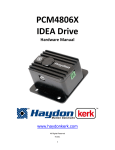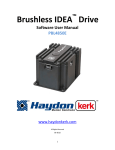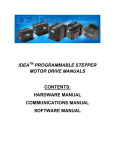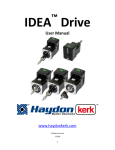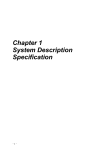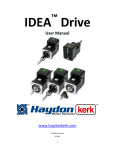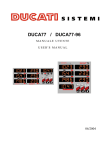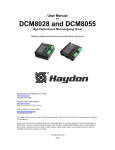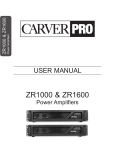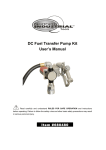Download Hardware Manual - Haydon Kerk Motion Solutions
Transcript
IDEA Drive Hardware Manual www.haydonkerk.com All Rights Reserved 4‐2013 1 Table of Contents Revision History .................................................................................................................. 3 Introduction ........................................................................................................................ 4 ACM4806E & PCM4806E Specifications ............................................................................ 5 ACM4806E Drawing ........................................................................................................ 6 PCM4806E Drawing ........................................................................................................ 7 ACM4826E & PCM4826E pecifications .............................................................................. 8 ACM4826E Drawing ........................................................................................................ 9 PCM4826E Drawing ...................................................................................................... 17 ACM7539E & PCM7539E pecifications ............................................................................ 11 ACM7539E Drawing ...................................................................................................... 17 PCM7539E Drawing ...................................................................................................... 17 Connections ...................................................................................................................... 14 Connections Digram ..................................................................................................... 17 Accessories ....................................................................................................................... 15 RS‐485 Pin Descriptions ................................................................................................... 16 Encoder Inputs .................................................................................................................. 17 Encoder Wiring ............................................................................................................. 17 Digital I/O Pin Descriptions .............................................................................................. 19 Digital I/O Wiring ......................................................................................................... 20 Digital Output Wiring Examples .................................................................................. 21 Digital Input Wiring Examples ..................................................................................... 21 2 Revision History Date Description September 2011 Initial version January 2012 Added digital input wiring examples March 2013 Manuals combined Wiring examples revised 3 Introduction This manual is intended to provide basic hardware specifications for the Haydon Kerk IDEA drive. Several styles of the IDEA drive are available. For detailed information on use and programming of the drive, please refer to the IDEA Drive User’s Manual, available at idea‐drive.com. 4 ACM4806E / PCM4806E IDEA Drive Specifications Attribute Value Drive Input Voltage Range 12‐48Vdc Maximum Drive Current (per phase) 0.6Arms (Plus optional 30% boost during ramping) Step Modes Full, Half, ¼, 1/8, 1/16, 1/32, 1/64 Communications USB (Mini B connector) RS‐485 Digital I/O Voltage Range 5‐24Vdc Digital Inputs 4 Digital Sinking Outputs 4 Digital Output Maximum Sinking Current 200mA (each) Digital Input Maximum Current 8mA (each) Maximum Temperature 70ºC (Measured at heat sink) Program Storage Size‐Type 85 Kbytes‐Flash Maximum Number of Stored Programs 85, Referenced by 10 character program names Position counter range 64bit Type of Ramping Trapezoidal Interrupt sources 4 inputs (rising, falling or both edges), internal position counter (when reaching a programmed position). 5 ACM4806E IDEA Drive Engineering Drawings 6 PCM4806E IDEA Drive Engineering Drawings 7 ACM4826E / PCM4826E IDEA Drive Specifications Attribute Value Drive Input Voltage Range 12‐48Vdc Maximum Drive Current (per phase) 2.6Arms (Plus optional 30% boost during ramping) Step Modes Full, Half, ¼, 1/8, 1/16, 1/32, 1/64 Communications USB (Mini B connector) RS485 Digital I/O Voltage Range 5‐24Vdc Digital Inputs 4 Digital Sinking Outputs 4 Digital Output Maximum Sinking Current 200mA (each) Digital Input Maximum Current 8mA (each) Maximum Temperature 70ºC (Measured at heat sink) Program Storage Size‐Type 85 Kbytes‐Flash Maximum Number of Stored Programs 85, Referenced by 10 character program names Position counter range 64bit Type of Ramping Trapezoidal Interrupt sources 4 inputs (rising, falling or both edges), internal position counter (when reaching a programmed position). 8 ACM4826E IDEA Drive Engineering Drawings 9 PCM4826E IDEA Drive Engineering Drawings 10 ACM7539E / PCM7539E IDEA Drive Specifications Attribute Value Drive Input Voltage Range 12Vdc up to the lesser of: 8 times the motor voltage or 75Vdc. Maximum Drive Current (per phase) 3.85Arms (Plus optional 30% boost during ramping) Step Modes Full, Half, ¼, 1/8, 1/16, 1/32, 1/64 Communications USB (Mini B connector) RS‐485 Digital I/O Voltage Range 5‐24Vdc Digital Inputs 4 Digital Sinking Outputs 4 Digital Output Maximum Sinking Current 200mA (each) Digital Input Maximum Current 8mA (each) Maximum Temperature 70ºC (Measured at heat sink) Program Storage Size‐Type 75 Kbytes‐Flash Maximum Number of Stored Programs 75, Referenced by 10 character program names Position counter range 64bit Type of Ramping Trapezoidal Interrupt sources 4 inputs (rising, falling or both edges), internal position counter (when reaching a programmed position). 11 ACM7539E IDEA Drive Engineering Drawings 12 PCM7539E IDEA Drive Engineering Drawings 13 Connections Basic Wiring: To connect power to the drive and control it with the IDEA Drive User Interface you will need the following: • A power supply, minimum of 12VDC. • A PC • Power cable ( available from Haydon Kerk p/n 56‐1348) • Haydon motor terminated with Molex connector 39‐01‐2040 (4806 & 4826 drives only) o 7539 drive has screw terminals for a motor connection • 10 wire I/O cable (available from Haydon Kerk p/n 56‐1352 ). Note: this cable is only required if the drive is interacting with an external device. PCM (USB version) • USB to Mini B USB cable ( available from Haydon Kerk p/n 56‐1346 ) ACM (RS‐485 version) • USB to Mini B USB cable ( available from Haydon Kerk p/n 56‐1346 ) • RS‐485 cable (available from Haydon Kerk p/n 56‐1536‐4) • USB to RS‐485 converter (available from Haydon Kerk p/n UTR4852) The following page contains the proper wiring diagram for the IDEA drive, power supply and PC. The I/O and encoder cables are omitted. 14 Basic Wiring Diagram Accessories Accessories Part No. USB Cable (A to Mini B), 2 meters 56‐1346 Power Cable, 1 meter 56‐1348 I/O Cable, 1 meter 56‐1352 RS‐485 Cable, 1 meter 56‐1536‐4 Software Installation Disk 55‐010 Motor Connector Assembly 56‐1453 USB to RS‐485 Adapter UTR4852 Encoder Cable with flying leads, 1 foot 56‐1715 Encoder Harness to E4 encoder, 1 meter 56‐1639‐4 Encoder harness to E5/E6 encoder, 1 meter 56‐1621‐4 15 RS‐485 Pin Descriptions RS‐485 pins are often referred to by their read/write functionality Y = Rx+ Z = Rx‐ A = Tx+ B = Tx‐ Encoder Inputs The IDEA drive is equipped with inputs for a single‐ended, Quadrature encoder attached to the motor it drives. Quadrature encoders have 2 output signals, A and B, which are nominally 90 electrical degrees out of phase. On each rising or falling edge, the relative logic levels of the two phases can be used to determine the direction of rotation. The decoder within the drive interprets A leading B as motion in the clockwise direction, as viewed from the front face of the motor. This means that if a rising edge is detected on phase A, and phase B is at a logical high, then the motor just rotated counter‐clockwise. 16 The IDEA drive watches for and rising and falling transitions on phase A, and increments or decrements the position counter accordingly. Using this method, a 1000 line optical rotary encoder would have 2000 counts per revolution, and a change in position would be detected every 0.18º. The IDEA drive line of products can be configured to use the encoder feedback in a number of ways. For further detail on the encoder functions available, please see the IDEA Drive user’s manual, available at idea‐drive.com. Encoder Wiring The encoder connector can be wired to any 2 channel quadrature encoder that operates between 3.3Vdc and 5Vdc. For encoders that work on 5VDC, power to the encoder can be supplied through pin 1 of the encoder connector, otherwise a separate 3.3Vdc power supply is required. Whether or not power is being supplied by the drive, pin 2 must be connected to the same ground as the encoder. This is internally connected to the IDEA drive’s ground connection. Pin 3 is for encoders with an index signal. This may be left unconnected, and is for future revisions which may make use of the index signal. Pins 4 and 5 are the B and A connections, respectively. When the output shaft of the motor is rotating clockwise as viewed from the front of the motor phase A should lead phase B. Check your encoder’s documentation to check if A and B need to be swapped. 17 Digital I/O Pin Descriptions Open Collector Output Pin Description Input Pin Description 18 Digital I/O Wiring The IDEA drive has four optically isolated inputs and four optically isolated open‐ collector outputs. A power supply is necessary to activate the opto‐isolators with a voltage range of 5‐24VDC. As the outputs are open‐collector, they will need a pull‐up resistor tied to the + I/O supply if a high level voltage is required. The outputs are capable of sinking up to 200mA each. Note: The inputs can be used in two ways. They can be connected to logic levels that swing between I/O supply ground and + I/O supply, or they can be attached to a switch connected to I/O supply ground. In the second configuration, when the switch is open, the drive will see this as a logic high, when the switch is closed, and the input is connected to I/O supply ground, the drive will see this as a logic low. Note: When an input is connected to a mechanical switch or relay, a phenomenon called “bounce” can occur. When the switch contact is almost closed, several electrical arcs can form. If an input is being used as an interrupt, each arc will be seen as a rising and falling edge, causing several false interrupts to trigger. Any input being used as an interrupt source should only be attached to solid state devices or a switch with debounce circuitry. Digital Output Wiring Examples 19 Digital Input Wiring Examples 20




















